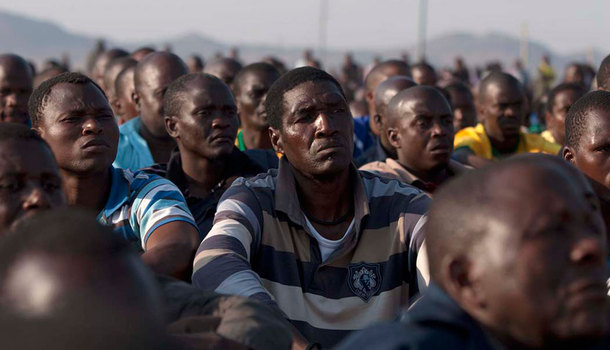From the perspective of the global South, the primary extraction of raw materials like coal, the subjugation of popular autonomy, the implementation of debt as a form of social control and the continued expansion of climate change are clearly intertwined. The repression of the miners’ strike in South Africa is part and parcel of mineral policy in Australia, oriented as both are to the expanding Chinese market. The intended consequences include ruinous African debt and the inevitable by-product is constantly accelerating climate change.
This interface has been perfectly visible from the South for some considerable time. In 1987, Thomas Sankara, then president of Burkina Faso spoke to the Organisation of African Unity (now the African Union) in Addis Ababa. Sankara called for the creation of a United Front Against Debt:
We think that debt has to be seen from the standpoint of its origins. Debt’s origins come from colonialism’s origins. Those who lend us money are those who had colonized us before. Under its current form, that is imperialism-controlled, debt is a cleverly managed re-conquest of Africa, aiming at subjugating its growth and development through foreign rules. Thus, each one of us becomes the financial slave, which is to say a true slave.
Sakara was assassinated a few months after making this call. His policies had also included the nationalization of the country’s mineral wealth. If Sarkana’s warnings had been heeded two decades ago, perhaps Africa would not be in its present crisis, forced to generate materials to produce foreign exchange revenues to pay down its debt.
Speaking at the memorial service for the miners killed by South African police (above), Julius Malema reprised these themes on Thursday, calling again for nationalization of the mines:
The democratically elected government has turned on its people. This marquee we are gathered under, the Friends of the Youth League paid for this. The government did nothing for you, we are helping you. Government ministers are just here to pose for pictures. We are here with you, you must soldier on – never listen to cowards. We mustn’t stop until the whites agree to give us some of the money in these mines.
The crowd responded by storming the stage, causing the rapid exit of government ministers and politicians. Police were barred from attending. As the national week of mourning continues, church leaders have spoken out against Lonmin and students at Wits University in Johannesburg are set to march. A national inquiry into the events has already been established but it is not clear if the ANC can contain the wave of radical protest the massacre has set in motion. Malema may be an opportunist, as some charge, but the grievances he articulates are all too real.
Here in Australia, mining companies are retrenching. Australia has done remarkably well out of the commodities boom, servicing the exploding Chinese economy. While officials continue to forecast a renewed peak in two years, hard-line mining executives have declared Australian coal “non-cash generative.” The blame is placed on the carbon tax introduced at enormous political cost by the current government. No credit is given in Australian media for the climate-positive aspects of the tax. The implication is clear: mining will relocate to countries with a less “burdensome” tax structure–like South Africa.
To understand this, you need to know that before 2005, coal sold for about A$30 a ton. At the height of the boom, it reached A$140. Paul Cleary, a journalist for the right-of-center Australian, writes:
Mining dominates our society, our economy, and even our political system.
Now it sells for “only” A$90, a 300% increase on the price seven years ago, which is apparently not enough. The business pages are awash with articles about the end of the mining boom.
Let’s be under no illusions as to who dominates the agenda in the U. S. The oil giant Shell has been reported to be determined to begin drilling in the Arctic this summer, even though its own safety procedures in case of a blowout are not finished. If this was a movie, you know what would happen: there’d be a blowout, only for the maverick hero to return and cap the well. There are no heroes any more. The drilling has to begin to make sure that, if Obama happens to be re-elected, he does not renege on his sell-out.
Sarkana was right, only he did not go far enough. The reconquest forced by the combination of debt and mining was not just of Africa: it was planetary. So are the consequences. Let’s hope that his heirs in South Africa can begin the resistance.


Pingback: Turning the World Upside Down | Occupy 2012
Pingback: Sense of Planet/Planet Sensing | Occupy 2012
Pingback: Sense of Planet/Planet Sensing | Occupy 2012